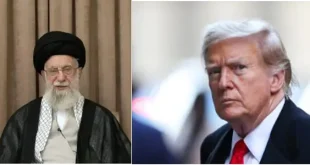Web Desk: President Donald Trump’s proposal for the U.S. to assume control of war-torn Gaza and transform it into a “Riviera of the Middle East,” while relocating Palestinians elsewhere, has upended longstanding U.S. policy on the Israeli-Palestinian conflict and sparked widespread condemnation, according to a Reuters report.
The controversial plan, unveiled by the former New York property developer, was met with swift criticism from international powers. Saudi Arabia, a key regional player Trump hopes will normalize ties with Israel, outright rejected the proposal. Turkey labeled it “unacceptable,” while France warned it could destabilize the Middle East. Other nations, including Russia, China, Spain, Ireland, and the UK, reaffirmed their support for the two-state solution, which has underpinned U.S. policy in the region for decades.
In his first major Middle East policy announcement, Trump outlined a vision of building a resort in Gaza where international communities could coexist peacefully. This comes after more than 15 months of Israeli bombardment that has devastated the coastal enclave, killing approximately 62,000 Palestinians and injuring 112,000 others, mostly civilians. Trump’s son-in-law and former advisor, Jared Kushner, previously described Gaza as “valuable” waterfront property.
The proposal sent shockwaves through diplomatic circles worldwide. China voiced opposition to the forced displacement of Palestinians, with Foreign Ministry spokesperson Lin Jian stating, “China has always believed that Palestinians governing Palestine is the basic principle of post-conflict governance,” and reiterating Beijing’s support for a two-state solution.
France delivered some of the harshest criticism, asserting that forcibly displacing Palestinians from Gaza would violate international law, undermine Palestinian aspirations, and destabilize the region.
Hamas, the Palestinian resistance movement that has governed Gaza since winning the 2006 elections, dismissed Trump’s plan as “ridiculous and absurd.” Sami Abu Zuhri, a Hamas official, warned that such ideas could “ignite the region,” while reaffirming the group’s commitment to its ceasefire agreement with Israel and ongoing negotiations.
It remains unclear whether Trump intends to pursue the plan or is using it as a bargaining tactic. He provided no specifics during a joint press conference with Israeli Prime Minister Benjamin Netanyahu, who is visiting Washington despite an International Criminal Court arrest warrant against him.
Russia reiterated its stance that Middle East peace can only be achieved through a two-state solution, while Spain’s Foreign Minister José Manuel Albares emphasized, “Gaza is the land of Gazan Palestinians, and they must stay in Gaza.” Amnesty International’s Executive Director Paul O’Brien condemned the proposal, stating that displacing Palestinians from Gaza would be “tantamount to destroying them as a people.”
Trump’s “Riviera” announcement followed an earlier proposal to permanently resettle over two million Palestinians from Gaza into neighboring countries. A January UN damage assessment estimated that clearing over 50 million tons of rubble left by the war could take 21 years and cost up to $1.2 billion.
The idea of the U.S. taking direct control of Gaza contradicts long-standing U.S. and international policy, which envisions Gaza as part of a future Palestinian state alongside the occupied West Bank and East Jerusalem.
U.S. Democratic Senator Chris Murphy lambasted the proposal, calling it “a bad, sick joke” and warning that a U.S. invasion of Gaza could result in thousands of American casualties and decades of conflict in the Middle East.
The plan also raises questions about Saudi Arabia’s willingness to join a U.S.-brokered effort to normalize relations with Israel. While Saudi Arabia is a key U.S. ally, it has firmly rejected any attempts to displace Palestinians, with its Foreign Ministry stating that the Kingdom will not establish ties with Israel without the creation of a Palestinian state. This directly contradicts Trump’s claim that Riyadh is not insisting on a Palestinian homeland.
Saudi Crown Prince Mohammed bin Salman has reportedly affirmed the Kingdom’s position in “a clear and explicit manner,” leaving no room for interpretation.
Trump hopes Saudi Arabia will follow the example of the United Arab Emirates and Bahrain, which normalized relations with Israel under the 2020 Abraham Accords, becoming the first Arab states in 25 years to do so.
Trump announced plans to visit Gaza, Israel, and Saudi Arabia but did not specify a timeline. Netanyahu avoided commenting on the proposal directly, instead praising Trump for “thinking outside the box” and offering “fresh ideas.”
Displacement remains a deeply sensitive issue for Palestinians and Arab nations. Many Palestinians fear a repeat of the Nakba, or “catastrophe,” referring to the mass displacement during the 1948 war that accompanied the establishment of Israel.
“Trump can go to hell, with his ideas, with his money, and with his beliefs,” said Samir Abu Basil, a 40-year-old father of five from Gaza City, in a message to Reuters. “We are going nowhere. We are not some of his assets. If he wants to resolve this conflict, he should take the Israelis and put them in one of the states there [in America]. They are the strangers, not the Palestinians. We are the owners of the land.”




